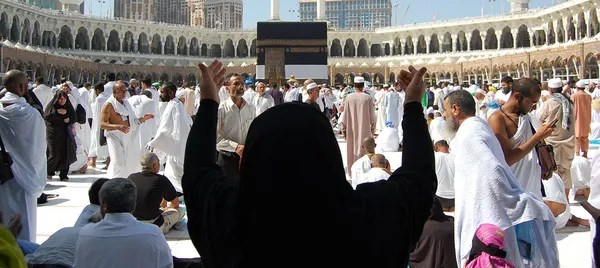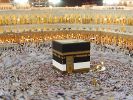Eye For Film >> Movies >> A Sinner In Mecca (2015) Film Review
A Sinner In Mecca
Reviewed by: Jennie Kermode

Parvez Sharma's 2007 film A Jihad For Love, made on a tiny budget, became a worldwide sensation. By addressing the largely forbidden topic of homosexuality in Islam, it also made him a marked man. Whilst some Muslim authorities condemned him and some anti-Islamic groups tried to use the film as an attack on Islam, however, Parvez's own religious convictions remained strong. It was because of this and a deep desire to cleanse himself of his sins that he felt compelled to undertake the Hajj, or pilgrimage to Mecca. But that meant travelling to Saudi Arabia, a country where being gay is punishable by death.
It's a powerful premise. Parvez mentions briefly that his husband doesn't understand his need to undertake dangerous journeys, and one can't help but feel for the quiet New Yorker left at home to worry. There's an uneasiness between Parvez's professed goals and these more complex personal motivations, at times making his quest seem inappropriately self-centered, but there's no doubt that he changes as the journey progresses, perhaps in ways he didn't expect, and his inner conflicts make it more compelling. Meanwhile, we see snapshots of the Indian town where he grew up, of a more relaxed Islam, and we hear about the mother who died from cancer unable to forgive him for his sexuality.

Having already explored the tensions between religion and sexuality in some depth in his previous work, Parvez doesn't actually spend too much time on it here. As his journey progresses, other themes begin to emerge, some of them equally challenging. Footage from Mecca is generally only released through approved channels; individuals are not supposed to film what is, for many, an intensely private process. This places Parvez in a difficult ethical position and it's good to see that he generally refrains from filming the faces of those whose voices are captured in the film, but what he is able to do is illustrate to the wider world some of the ways in which the holy city has changed over the years.
A scene in which he emerges from the Grand Mosque into an adjoining shopping mall, where pilgrims are invited to go straight from kissing the Kaaba stone to sipping a Starbucks, will be shocking to many viewers, like the air conditioned corridors now used for the sa'ay between Safa and Marwah. For those who already know to expect this, the sight of streets knee-deep in litter that pilgrims have dropped is still distinctly depressing. If the film gets a significant audience outside LGBT communities, this is likely to add to the controversy about the Saudi government's management of the holy sites.
Despite all this, the principal focus of the film is on one man's personal relationship to his faith, and his willingness to be open about his several uncertainties, together with his dawning realisation that it isn't going to change quickly just for his sake, provides something many people will be able to relate to. It touches on a number of the central conflicts in contemporary Islam (and in religion more widely) but does so in a way that invites reflection rather than getting people's backs up. Troubled and human, he may not seem like a natural authority, but as he notes, everyone is a sinner when setting out for Mecca.
Reviewed on: 17 Apr 2015
















